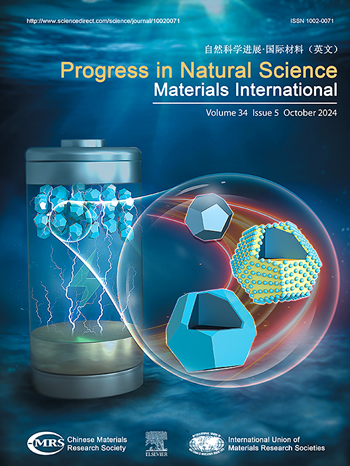A facile data-driven battery capacity estimation framework for on-road plug-in hybrid electric vehicle
IF 7.1
2区 材料科学
Q2 MATERIALS SCIENCE, MULTIDISCIPLINARY
Progress in Natural Science: Materials International
Pub Date : 2025-02-01
DOI:10.1016/j.pnsc.2024.11.012
引用次数: 0
Abstract
A data-driven framework with strong generalization capabilities is proposed to effectively extract features and easily access battery capacity. This framework can make highly accurate predictions for the battery capacities of plug-in electric vehicles. The feature extraction process is entirely based on statistics, which are always available and can be generalized to various types of battery data. An improved ampere-hour integral method can easily access battery capacity with just short-charging segments lasting 500 s. Several machine-learning models are trained to verify the framework's effectiveness, with the best model achieving a test error of 0.84 % based on leave-one-out validation. SHAP values are used to provide a reasonable interpretation of the relationships between the constructed features and model outputs. The proposed framework offers advantages such as reduced computational resources, wide generalization, and high prediction accuracy, showing great potential for battery management.
基于数据驱动的插电式混合动力汽车电池容量估算框架
提出了一种具有较强泛化能力的数据驱动框架,可以有效地提取特征并方便地获取电池容量。该框架可以对插电式电动汽车的电池容量进行高度准确的预测。特征提取过程完全基于统计数据,统计数据总是可用的,并且可以推广到各种类型的电池数据。改进的安培小时积分方法可以很容易地获得电池容量,只需短暂的充电段持续500秒。几个机器学习模型被训练来验证框架的有效性,最好的模型在留一验证的基础上实现了0.84%的测试误差。SHAP值用于对构造特征和模型输出之间的关系提供合理的解释。该框架具有计算资源少、泛化范围广、预测精度高等优点,在电池管理方面具有很大的应用潜力。
本文章由计算机程序翻译,如有差异,请以英文原文为准。
求助全文
约1分钟内获得全文
求助全文
来源期刊
CiteScore
8.60
自引率
2.10%
发文量
2812
审稿时长
49 days
期刊介绍:
Progress in Natural Science: Materials International provides scientists and engineers throughout the world with a central vehicle for the exchange and dissemination of basic theoretical studies and applied research of advanced materials. The emphasis is placed on original research, both analytical and experimental, which is of permanent interest to engineers and scientists, covering all aspects of new materials and technologies, such as, energy and environmental materials; advanced structural materials; advanced transportation materials, functional and electronic materials; nano-scale and amorphous materials; health and biological materials; materials modeling and simulation; materials characterization; and so on. The latest research achievements and innovative papers in basic theoretical studies and applied research of material science will be carefully selected and promptly reported. Thus, the aim of this Journal is to serve the global materials science and technology community with the latest research findings.
As a service to readers, an international bibliography of recent publications in advanced materials is published bimonthly.

 求助内容:
求助内容: 应助结果提醒方式:
应助结果提醒方式:


